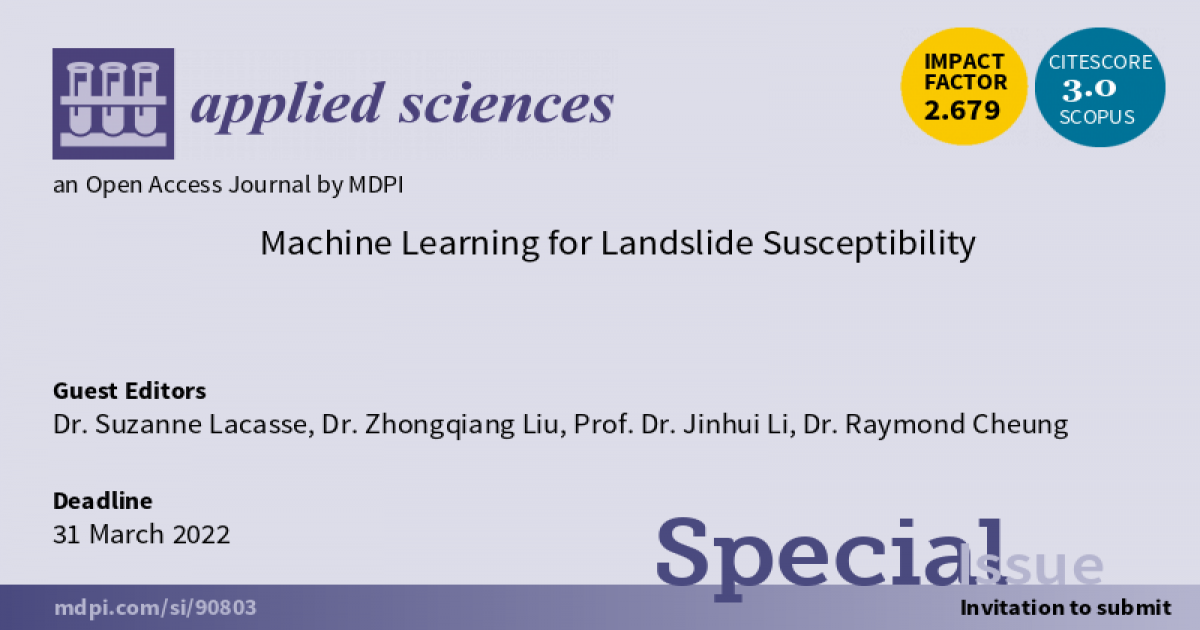Machine Learning for Landslide Susceptibility
A special issue of Applied Sciences (ISSN 2076-3417). This special issue belongs to the section "Earth Sciences".
Deadline for manuscript submissions: closed (31 March 2022) | Viewed by 6008

Special Issue Editors
Interests: risk assessment and management: dams, landslides, offshore foundations, tunneling; machine learning in geotechnics; geotechnical design; laboratory and in situ testing; interpretation of soil parameters
Interests: offshore foundations; offshore wind turbines; machine learning; reliability-based design
Special Issues, Collections and Topics in MDPI journals
Interests: slope stability; site investigation; offshore foundations; georisk; geotechnical hazards; monitoring in geotechnical engineering; machine learning; tunneling; early warning…
Special Issue Information
Dear Colleagues,
Landslides pose a serious risk to population, property, and environment in mountainous regions and even in flat areas worldwide. Landslides have caused massive casualties and significant losses and damage to property. In recent years, machine learning (ML) techniques, including deep learning methods, have increasingly been used to model complex landslides. Analyses so far have demonstrated promising predictive ability compared to traditional, deterministic solutions, and physical model testing.
This Special Issue of Applied Sciences seeks to incorporate the latest developments in machine learning with respect to modeling and prediction of landslide susceptibility, including quantitative and qualitative assessments of the classification, volume (or area) and spatial distribution of landslides, as well as the velocity, intensity, and runout (and consequences) of existing or potential landsliding.
Authors are encouraged to submit their latest research and applications in the broad field of “Applications of Machine Learning for Landslide Susceptibility”. Authors are encouraged to also consider how their models can be disseminated, for example, digitally or by means of equations, so that readers and practitioners can make use of them in their own work.
Dr. Suzanne Lacasse
Dr. Zhongqiang Liu
Prof. Dr. Jinhui Li
Dr. Raymond Cheung
Guest Editors
Manuscript Submission Information
Manuscripts should be submitted online at www.mdpi.com by registering and logging in to this website. Once you are registered, click here to go to the submission form. Manuscripts can be submitted until the deadline. All submissions that pass pre-check are peer-reviewed. Accepted papers will be published continuously in the journal (as soon as accepted) and will be listed together on the special issue website. Research articles, review articles as well as short communications are invited. For planned papers, a title and short abstract (about 100 words) can be sent to the Editorial Office for announcement on this website.
Submitted manuscripts should not have been published previously, nor be under consideration for publication elsewhere (except conference proceedings papers). All manuscripts are thoroughly refereed through a single-blind peer-review process. A guide for authors and other relevant information for submission of manuscripts is available on the Instructions for Authors page. Applied Sciences is an international peer-reviewed open access semimonthly journal published by MDPI.
Please visit the Instructions for Authors page before submitting a manuscript. The Article Processing Charge (APC) for publication in this open access journal is 2400 CHF (Swiss Francs). Submitted papers should be well formatted and use good English. Authors may use MDPI's English editing service prior to publication or during author revisions.
Benefits of Publishing in a Special Issue
- Ease of navigation: Grouping papers by topic helps scholars navigate broad scope journals more efficiently.
- Greater discoverability: Special Issues support the reach and impact of scientific research. Articles in Special Issues are more discoverable and cited more frequently.
- Expansion of research network: Special Issues facilitate connections among authors, fostering scientific collaborations.
- External promotion: Articles in Special Issues are often promoted through the journal's social media, increasing their visibility.
- e-Book format: Special Issues with more than 10 articles can be published as dedicated e-books, ensuring wide and rapid dissemination.
Further information on MDPI's Special Issue polices can be found here.






